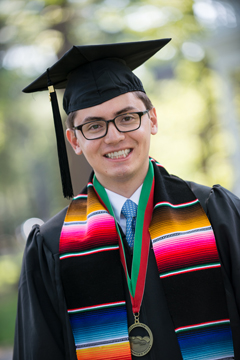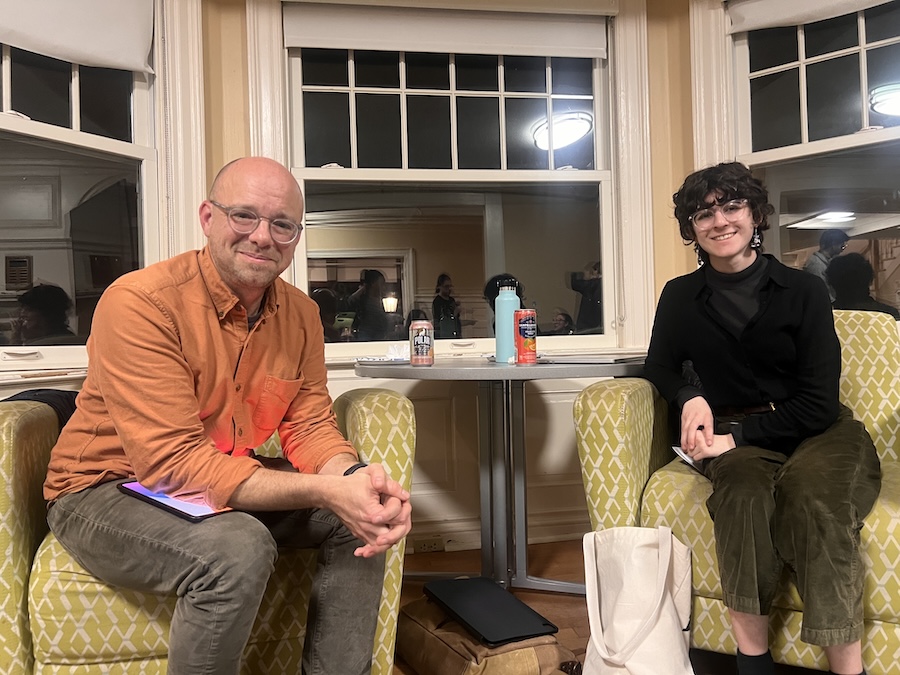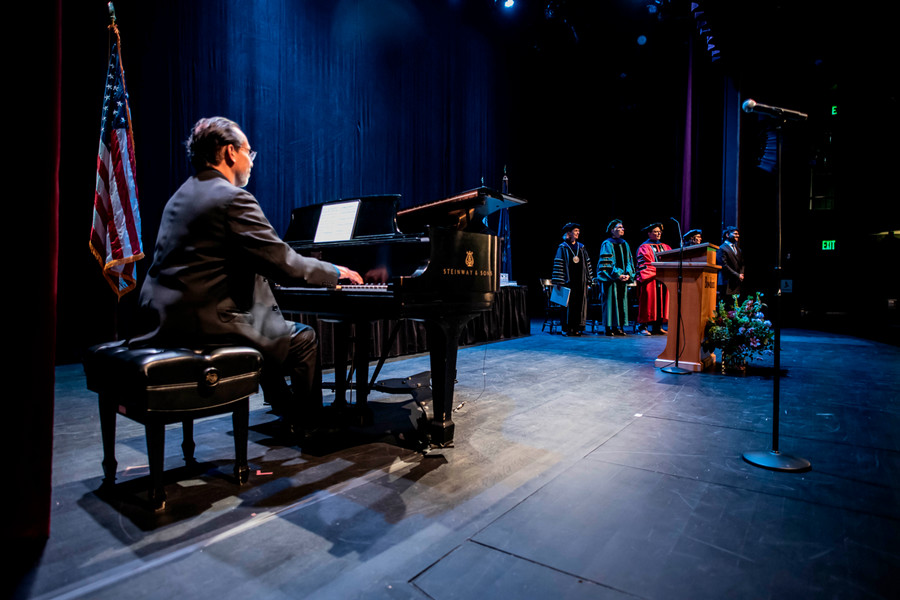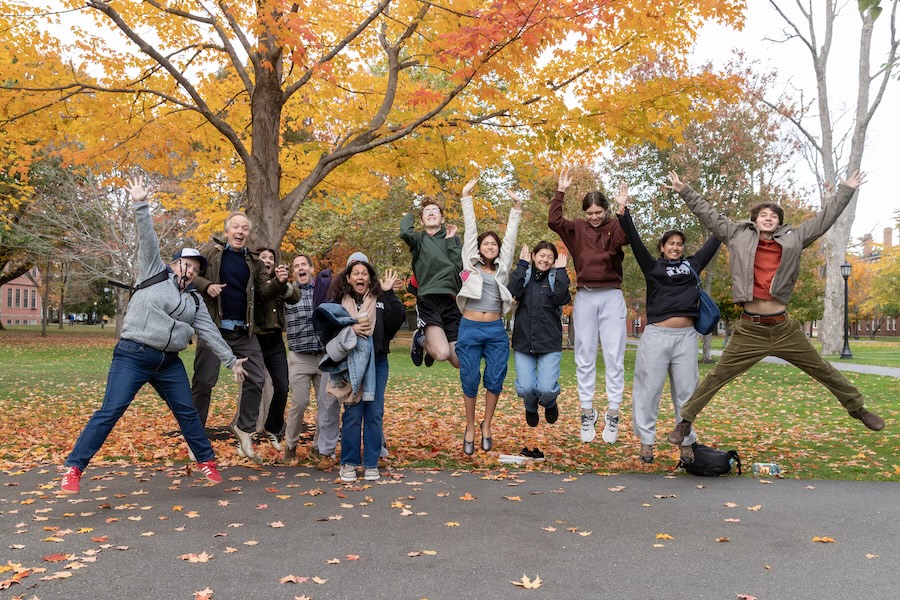Commencement 2016 Student Speaker: Bill De La Rosa ’16 on ‘The Power of the Common Good’
By BowdoinGoodwin Commencement Prize Winner Bill De La Rosa ‘16 delivered the address, “The Power of the Common Good,” at Bowdoin College’s 211th Commencement May 28, 2016.
President Rose, Members of the College, and Guests – I am thankful and honored to have been given the opportunity to share a personal message with you on this special day.
On a warm September morning in 1802, while standing beneath the pines in front of Massachusetts Hall, Joseph Mckeen, Bowdoin’s first president declared in his inaugural address, “It ought always to be remembered, that literary institutions are founded and endowed for the common good, and not for the private advantage of those who resort to them for education.”
As I reflect on my four years at Bowdoin, and the extraordinary privilege I’ve had attending a place like this, it is clear to me that I would not be standing here had it not been for – as you probably have guessed – the common good.
I am a Mexican-American student who was born in a small border town known as Nogales, Arizona but raised on the Mexican side, Nogales, Mexico. In 2000, when I was seven-years-old, my family – in search of a better future – made the risky decision to move permanently to Tucson, Arizona in search of a better future. We left everything we owned in the small motel room where I spent my childhood, and arrived in Tucson with no money, no place to go, no place to call home. We wandered a bit, sleeping wherever we felt safe – in our car, in alleyways, within trailer parks – until our savings slowly began to grow. When I was eight, my mother would make homemade flour tortillas and tamales, and I would go around the neighborhood door-to-door to sell them. $1 dolar for a dozen tortillas, $8 dolares for a dozen tamales. My mother earned a living cleaning rooms at our local Motel 6, and sometimes I would tag along to help her clean, so she could come home a little bit earlier.
In 2005, when I was eleven-years-old, my family, which now had six members, qualified for Section 8 housing. For the first time in our lives we had a place to call home, a place that was affordable, stable, and where we made many wonderful memories together. These memories, however, did not last long. In October 2009, my mother was deported from the United States to Mexico and she was barred from returning to her home and family for ten years. My mother is there now. This is the reason she was absent from my high school graduation, why she was not present in Missouri when I received the Truman Scholarship, and why she is not here today, to see her beloved boy graduate from Bowdoin College.
After my mother’s removal from the United States, my father suffered a devastating stroke, and my older brother joined the Marines to serve this country and support our family. I was left with the responsibility and joy of looking after my father, my nine-year-old sister, and my four-year-old brother.
Today, as I reflect on my upbringing, I am aware that I could not have done this alone. Had it not been for the collective effort of my community – the hot meals delivered, the support I received from my friends, mentors, and siblings – the love and sacrifices of my parents, had it not been for the power of the common good, I would not be standing here, nor would you be sitting there.
While my story is atypical, elements of it are universal. We all have enjoyed the sacrifices of parents, many of whom have taken loans and deferred dreams, so that we could pursue our own. We all have families who have encouraged our success. We all have mentors and faculty who have pushed us to do more than we imagined. And we all have caretakers and friends who have supported us as we enter adulthood. They have been along this journey to success just as much as we. We should celebrate their contributions today.
 Bill De La Rosa ’16
Bill De La Rosa ’16
Based on his personal experience having been born in the US and raised in Mexico, Bill De La Rosa ’16 has dedicated himself to improving the lives of current and future immigrants.
He volunteered in the Sonoran Desert, bringing food, water, and medicine to sick and disoriented migrants.
He has offered training sessions to prepare migrants for the perilous desert crossing.
De La Rosal led an Alternative Spring Break trip to Arizona and Mexico to educate Bowdoin students about the consequences of heightened border security measures and to introduce them to the humanitarian groups working at the border.
For his honors project, he conducted ethnographic research looking into how US border-security policies have shifted patterns of migration and increased the danger of the journey from Mexico to the US.
With his ability to both personalize and intellectualize the human narratives of unemployment, poverty, trauma, uncertainty and fear, De La Rosa has provided the Bowdoin community a unique perspective on the national discourse on US immigration.
De La Rosa is an accomplished student—a Truman scholar, a Mellon Mays undergraduate fellow, a Bill Gates Millennium scholar, and a Michael and Susan Dell scholar.
He was also named “Hispanic Scholar of the Year” by the Hispanic Scholarship Fund.
De La Rosa’s good work will continue after graduation. He has been admitted to Oxford University’s master’s program in migration studies, which he will begin next fall or the year after.
As I reflect on my four years at Bowdoin, and think of all I have learned, there is no doubt that this campus is intellectually rich. We learn in the classroom from amazing professors and from the extraordinary guests we bring to this place – artists, activists, academics, and ambassadors. Bowdoin’s intellectual stimulus, moreover, is paralleled by the learning that happens outside the classroom walls. The warm smiles we encounter in dining halls, the greetings we receive from custodians in our residential dorms, and the groundskeepers who care for this environment model for us how we can make our mark in more individual ways. From the people who are sometimes rendered invisible, we learn about the differences we can make in other’s lives and our environment when we are mindful.
Being mindful of the privilege of our Bowdoin education, we must remember it comes with great responsibility. In a recent talk to students in California, Associate Justice of the Supreme Court, Sonia Sotomayor said, “We have reached a privilege that most of our community members don’t have. You’re here because of all the people who came before you, who opened the doors to this college to you. And you have to keep those doors open for the kids who come after.”
Growing up my mother would always tell me, “Hay que sembrar buenos frutos para cosechar buenas cosas.” We have to plant good seeds, to harvest great things. I would add that now that we are reaping the fruits of our labor and those who have supported us, it is our responsibility to help others plant their seeds. We all can contribute to the common good by making a meal for a neighbor, mentoring a new student, advocating for the environment, or engaging with global disparities. We all have the power of the common good.
It is my hope that through the common good we can make this world – this little piece of real estate that we call earth – a more just and compassionate place, and that we will see ourselves as not just polar bears but as citizens of this planet, a planet that is in great need of people willing to see beyond ethnicity, nationality, gender, religion, and ideological differences. The power of the common good allows us to do that. Whether we serve in the public or the private sector, we must be confident about our own capacity to affect change on whatever level and remember that each and every gesture has a value in this world. Enhorabuena, Congratulations, Class of 2016. Gracias. Thank you.



